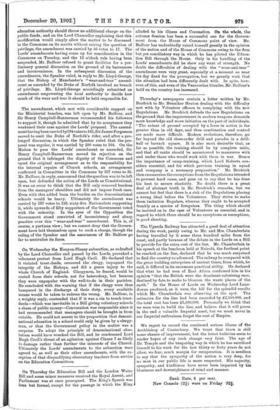On Wednesday the Kenyon-Slaney subsection, as redrafted by the Lord
Chancellor and passed by the Lords, provoked a vehement protest from Lord Hugh Cecil. He declared that it violated trust-deeds, censured the clergy, impugned the integrity of the Bishops, and did a grave injury to the whole Church of England. Clergymen, be feared, would be ousted from their schools, not for heterodoxy, but because they were unpopular with the well-to-do in their parishes. He concluded with the warning that if the clergy were thus hampered in the discharge of their duty, every available means would be taken to redress the wrong. Mr. Balfour, in a weighty reply, contended that if it was a sin to touch trust- deeds—which was inevitable in a Bill giving voluntary schools a share of public money—Convocation was responsible since it had recommended that managers should be brought in from outside. He could not assent to the proposition that denomi- national education in a school could only be given by a clergy- man, or that the Government policy in the matter was a surprise. To adopt the principle of denominational abso- lutism would have wrecked the Bill, and he condemned Lord Hugh Cecil's threat of an agitation against Clause 7 as likely to damage rather than further the interests of the Church. Ultimately the Lords' amendments to the subsection were agreed to, as well as their other amendments, with the ex- ception of that disqualifying elementary teachers from service on the Education Committees.










































 Previous page
Previous page